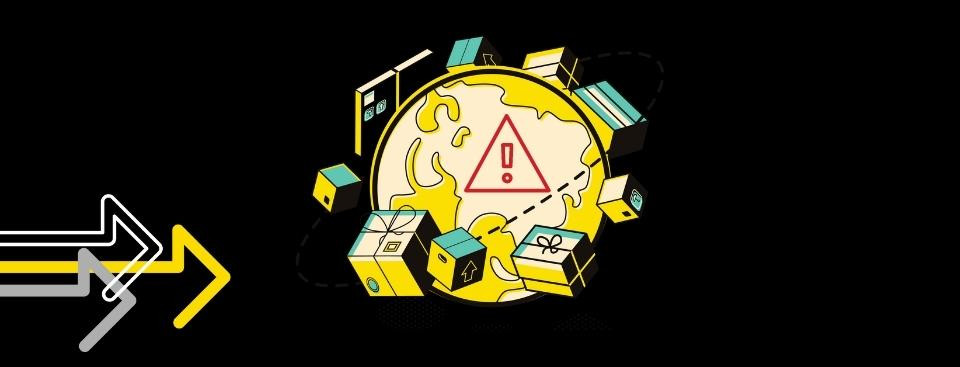How Does a Supply Chain Disaster Happen — And What Can a 4PL Do to Help?

No, it’s not just you — a lot has been going wrong in the world of supply chains lately. In fact, supply chain disruptions rose 88% year-over-year in 2021.
While most of us think of global pandemics and clogged-up ports when we hear the word ‘disruption,’ it actually encompasses many types of events. Whether it’s cyberattacks, natural disasters, labor shortages, or geopolitical unrest, there are all sorts of ways for things to go wrong.
While it’s never good to dwell on the past, it’s a smart idea to consider possible ways we could have dealt with disruptions before they happen again.
Let’s take a look at just one of the supply chain disasters of 2021 and the chain reaction it caused. Then we’ll dive into how a 4PL (fourth-party logistics company) can help you through these types of disruptions.
Read About CBIP's Adaptable 4PL Logistics Services
Deep freeze, deep trouble
You may have heard about the frightening effects a deep freeze in the U.S. state of Texas had on the local population last February. At that time, temperatures plummeted to -22 C and people were suddenly without heat.
Apart from creating dangerous conditions for the people of Texas, this event also rocked the global supply chain for plastics and other raw materials.
This event illustrates just how important even a single region can be for global supply chains. The state of Texas contains the largest petrochemical complex in the world. Those petrochemicals are a key component in products like plastic, synthetic fabrics, drugs, soaps, and more.
Naturally, when Texas was unable to export petrochemicals during the disaster, manufacturing began to feel the strain. Auto factories across the border also had to halt production.
Say that you are an apparel retailer who was affected by the Texas deep freeze. Most of your clients are based in the USA, so you have factories in Northern Mexico. Those factories depend on petrochemicals to produce all the synthetic materials needed for your clothing line, so when those raw materials stop coming from Texas, there is nothing you can do.
Your customers will likely demand their money back, and your brand’s reputation may be on the line. Meanwhile, the raw materials you already invested in are stuck in a different country.
So what could you have done to avoid these types of losses?
Turning to 4PL in a Crisis
The best way to avoid a situation like the above is to diversify your manufacturing bases.
For instance, an apparel retailer should take extra time to consider where their raw materials come from. Petrochemicals are produced massively in the Middle East, as well as in China. If you have existing factories in Central America, setting up manufacturing in Vietnam would be a great way to keep yourself insulated. That way, when things are going wrong on one side of the world, you still have operations running smoothly on the other.
Deciding where to manufacture can be tricky. There are so many factors to consider, including labor costs, local laws & regulations, and proximity to your end customer. That’s why it’s crucial to team up with an experienced partner.
Think of a 4PL as the connective tissue in your supply chain. It links you with the service you need, where and when you need it — including factories, warehouses, container storage, and last-mile services — and ensures you stay resilient in the face of volatility.
It’s important to look for a 4PL that provides you with more than just a platter of options, though. With the recent rise in global supply chain disruptions, what you really need is a 4PL that knows the industry in and out, and can provide guidance to you on how to mitigate your supply chain risk.
RELATED READING: Worried About Grand Theft Cargo? Here’s How Your Brand Can Minimize Cargo Theft in Your Supply Chain
There are a number of ways that a good fourth-party logistics company can help you mitigate risk. Check out three advantages of working with CBIP’s 4PL model below.
1. A 4PL integrates tech throughout your entire supply chain
According to the state of ecosystem and application integration report, 66% of polled companies lost up to $500,000 in revenue in 2020 due to poorly integrated IT.
Poorly integrated technology can result in lost orders, missing inventory, and money wasted through operational inefficiencies. And in today’s ultra-competitive environment, your company simply can’t afford to be using poorly integrated IT.
Integrating your entire supply chain is a detail-oriented, laborious process. You need a dedicated team who knows what they are doing, or you need to outsource.
At CBIP, we have a single, cloud-based system that integrates with all our partners. That means as soon as you start working with us, you get a high-tech system that works at every step of the process — without starting from square one when you need to make a change.
2. Get expert consulting services — without the hassle of hiring a consultant
Maybe you are thinking you would love to set up a tertiary factory in Australia to mitigate risk and get closer to your Aussie customers. The only problem? You don’t have the capacity to do the on-the-ground research in Australia to get manufacturing right.
CBIP has experts with deep insight into today’s key markets, including Australia. We have a local network of partners, and we even helped a customer set up warehousing there just last year. That customer was rewarded for their mitigation techniques when the Hong Kong ports were blocked, and they were able to keep business running since they had their stock spread out over a few different regions.
The best 4PLs will consult you on how to soften the effects of a possible supply chain disaster. We analyze and compare countless factors to figure out where you should source, manufacture, and warehouse your product, as well as what transportation services best fit your needs, including:
- Local political climate
- Trade laws
- Labor laws & availability
- Proximity to end customer
- Local climate and weather patterns
- Your company size, revenue, and goals
And much more.
3. 4PLs give you flexibility
Having backup options is always a good thing — particularly when something goes wrong in one link of your supply chain.
Working with a knowledgeable 4PL means that you don’t only get those options, but you get a trusted advisor on how to best deploy them.
There are two types of situations where this type of consulting becomes especially useful:
-
You are in crisis and need a way out
-
You are considering making changes to mitigate your risk, and wondering what to do
When you have a supply chain crisis, the job is pretty straightforward: Put out the fire ASAP.
4PL partners are great at this. A 4PL is experienced, decisive, and already has all the backup resources you may need. For instance, when you can’t get your raw materials from China because trucks are getting stopped at the border, your 4PL is making the calls to figure out how to reroute your inventory and get it to the nearest port right away.
The second point is more nuanced. That’s where the teamwork between you, the e-commerce company, and us, the 4PL, comes into play. Our job is to ensure your supply chain can overcome any major hurdles and advise you on the best way to steer clear of unnecessary risk.
Work with an experienced 4PL partner that evolves with you
Supply chain disruptions are a fact of life. But that doesn’t mean they need to stop your business in its. With CBIP as your trusted 4PL, you can continue to grow and reach new markets with confidence.
CBIP is backed up by the latest in supply chain technology and has a team of experts with experience in every major market. We’re also committed to leading a new generation of green logistics — today, we’re proud to be Asia’s first carbon-neutral 4PL.
Ready for a custom logistics plan that’s as adaptable as you are? Chat with one of our specialists today.






